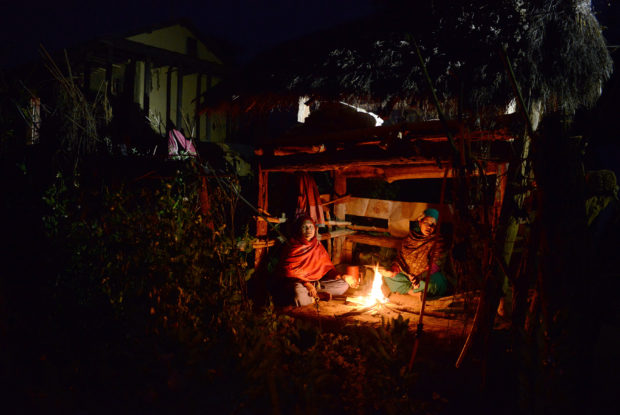
In this photograph taken on February 3, 2017, Nepalese women sit by a fire as they live in a Chhaupadi hut during their menstruation period in Surkhet District, some 520km west of Kathmandu. The practice of banning women from the home when they are menstruating is linked to Hinduism and considers women untouchable at this time. They are banished from the home, as they are barred from touching food, religious icons, cattle and men; and forced into a monthly exile sleeping in basic huts. In 2017, Nepal passed a new law criminalizing chhaupadi. It will come into effect this August, when anyone forcing a woman to follow the custom faces a three-month jail sentence and a fine of 3,000 rupee ($30). (AFP FILE PHOTO)
A young Nepali woman has died of suspected smoke inhalation while she was banished to a shed for menstruating under an ancient tradition banned more than a decade ago, police said on Wednesday.
Many communities in Nepal view menstruating women as impure and in some remote areas they are forced to sleep in a hut away from the home, a practice known as chhaupadi.
Gauri Bayak, 21, was found dead by her neighbors inside a smoke-filled hut on Monday morning in a village in the western district of Achham.
“She had lit a fire to keep herself warm and we suspect she suffocated and died of smoke inhalation,” local police chief Dadhi Ram Neupane told AFP.
Police are waiting for the results of a postmortem to confirm the cause of death.
Chhaupadi is linked to Hinduism and considers women untouchable when they menstruate, as well as after childbirth.
Barred from touching food, religious icons, cattle and men, they are banished from the home and forced to sleep in basic huts.
The practice was banned in 2005 but is still followed in parts of Nepal, particularly in remote western regions.
In 2017, a teenager died after being bitten by a snake while sleeping in a shed, and in 2016, two women died in separate incidents while following the ritual.
Also in 2017, Nepal passed a new law criminalizing chhaupadi. It will come into effect this August, when anyone forcing a woman to follow the custom faces a three-month jail sentence and a fine of 3,000 rupee ($30).
Manju Mahat, a district women’s rights official, said chhaupadi was “a clear violation of our human rights” and urged women’s families to “take responsibility and stop this practice”. /kga